Liberalization of visa regime for citizens of Moldova.
Following the declared goal, in June 2010, the authorities from Moldova started a dialogue with European Union regarding elimination of visas for Moldova’s citizens travelling to EU countries. The final step took place on 3 April 2014, when the President of European Parliament, Martin Schultz and representative of Presidency of EU, deputy foreign ministry of Greece, Dimitris Kourkoulas, by signing the modification of 539/2001 Regulation. Thus, starting with 28 April 2014, citizens of Moldova obtained liberalized visa regime, being allowed to travel with no visa, just with a biometric passport for up to 90 days during 6 months in 26 Schengen countries, plus Romania, Bulgaria, Cyprus and Croatia.
Beside the passport, the customs can ask the persons to present documents justifying the aims and condition of their stay in European countries, as well as medical assurance and sufficient financial resources for the period of stay. Moldova was the first country member of Eastern Partnership to obtain visa free regime.
On 28 April 2014, Moldova was the first country member of the Eastern Partnership to obtain visa free regime with 26 Schengen countries and plus Romania, Bulgaria, Cyprus and Croatia. Now citizens of Moldova can travel to Europe with no visa for up to 90 days during 6 months if holding a biometric passport.
The main concern was that once the borders will be open, citizens of a country affected by migration will take advantage and will depart abroad in large numbers. But in reality the situation wasn’t so scary. In the first eight hours of free circulation, 200 Moldavians crossed the border with biometric passport and in first four months 201 714 citizens went to European Union (according to Border Police). Most of those people use the opportunity to travel for vacation, to explore European countries, to meet with emigrated relatives, to visit friends.
In the article that follows we will present stories of people, of different ages and different backgrounds, for whom possibility to travel without visas offered freedom, new opportunities, possibility to reunite with families and to become better professionals. All of them were excited to travel, some of them even for the first time had the chance to fly and to have their vacation by the sea, and none of them is planning to migrate, preferring to stay and work in Moldova.
Valentina (47 years, medical assistant). In summer 2014, Valentina for the first time traveled to a Schengen country, to Greece, Athens, visiting her niece and spending in the same time her holiday at the seaside. She says: „I was so afraid, because I had to fly alone and I have never flew before. I was nervous about everything...how to pass the scanner, as I had an hearing device, and I though it may bring some difficulties, how to pass the passport control, how to check the luggage....can you imagine I even forgot to kiss goodbye my son who came with me to the airport. Inside the airport I was following other passengers, not to get lost. As soon as I was inside the plane, I’ve called my sons to say I love them, because who knows what can happen during the flight”.
Valentina had raised alone two sons and often lacked money, reducing the expenses as much as possible, not even thinking about travelling. This year she had been to the seaside for the first time. She was in Ukraine and later to Greece. But after being to Greece, she doesn’t even consider Ukraine for sea.
Her niece is over ten years emigrated in Greece and together with her husband and children had been coming in Moldova for once a year, but for short period. But until now Valentina never had the chance to visit her niece at her new home country and to see how she lives there. „I was at the sea and mountains, I have been walking all day long and I felt pain in my legs, but I was so happy to be there”. She was very impressed by her vacation. Valentina had been before to Romania, Ukraine, Belarus, but according to her the feelings are difficult to describe, feelings of amazement. Now she’s already planning about her new trip and is choosing new destination. Perhaps it will be Portugal. In the same time she is proud to be from Moldova, Valentina is not considering leaving the country, here she has a job, and she is appreciated by her colleagues and friends, her children are in Moldova. She is welcoming the liberalization of visa regime: “If I want to travel, I just need to choose the destination and immediately depart. It’s very easy, including crossing the border. Yes, I had all the additional documents, such as invitation, assurance, financial resources and I was ready to answer the questions, but I was just asked for my passport and aim of visit. And I must emphasize the positive attitude of the border police, it was a pleasure to communicate with them. “
Larisa (60 years, family doctor), together with her husband Vasile (59 years), children and nephews went for summer holidays to the sea in Greece. Larisa traveled before only to Romania and Russia, for Vasile it was a first visit to any European country. Both of them came back full of energy and impressions. Larisa says border police was friendly and understanding and of course to see Greece and the sea was a great experience. This was their first family travelling. “To spend time with your family, children and nephews is priceless. We’ve enjoyed every moment. Plus, they have traveled before, as for us it was first to long travel.” Larisa considers liberalization of visa regime a great achievement. “It’s true that we could travel before as well, but we had no time or money, plus we had to apply for visa. It might sound easy, but for us it wasn’t, we had to prepare a lot of documents, to stay in line, to pay for the visa and there always the possibility to receive refusal for visa or to get it only for a very short period of time. Now is much easier and less stressful.”
Larisa has already plans for the next vacation. “The other days, my nephew asked me: Grandma what are you dreaming about? And I’ve told him: Grandma is dreaming to see the Eiffel Tower”. Larisa would like to visit as many countries as possible, but Paris is next destination on the list. “I know French, so I think I will feel comfortable there. And my nephew want to teach me English as well. I liked the Greek holidays so much, that I want to travel more. Before we were more conservative and we were too focused on building a house, taking care of the material goods. Now, I and my husband are thinking about travelling, to meeting new people, learning new customs, seeing new countries and cities. That is what I call change of values.” Impressed by their experience, Larisa and Vasile agreed to save money each month, thus to raise money for the next summer. “As it was his travel to Europe, my husband was even more excited than me and he is the totally supporting the idea of travelling again next summer.”
Although now she can travel easier, Larisa has no interest in migrating. “To travel yes, I want as often as possible, but to migrate no. At my age I’m more attracted to my home country, parents, children, I want tranquility and less worries.”
Galina (59 years, radiologist) has a today who migrated to Italy for already 14 years. Usually her daughter was coming once a year in Moldova. But in August 2014, Galina with her husband had the chance to visit for the first time their daughter and nephew in Italy. “When I’ve seen my daughter I had tears of happiness, I cannot describe in words what I’ve felt in that moment, how much joy was in my heart.” Of course. Galina was nervous about this visit, she had to see new places, to communicate with different people in a new country. “I was afraid, but the fear was useless, because Italians and Europeans in general were friendly to us, always welcoming and polite even if they see we are foreigners and don’t speak the language. We had never felt discriminated or uncomfortable.” Her daughter with family will come in Moldova for the Easter holidays, but Galina is planning with her husband to go again to Italy for the next summer. “We already feel freer, and have the liberty to decide where and when to travel next. Consequently, we can spend more time with our family and to meet more often, not just once a year or even rarely.”
Galina confess she didn’t travel before mostly because of the need to obtain a visa, as they had to prepare documents, to spend time and stay with worries if their efforts will be paid off or they will receive a refuse. “We already are thinking on our next visit to travel a little bit, to see not just Italy and Bologna, but as well other towns or why not countries.”
Neither Galina is thinking about emigration. “Certainly we miss our daughter, but to move in Italy is not an option for us. We feel better in Moldova and we want to stay here. It’s true that level of salaries and of life is better in European Union, but nevertheless I chose to stay in Moldova. Now we have the mobility to travel and we can meet more often.”
Galina is sure that “we have to change our mentality, attitudes and approach towards things and not to wait someone will come and change it for us.”
Alexander (25 years, creator and administrator of a news site for youth). Alexander is a young and active man, who likes to travel. His goal is to visit all the existing countries and now he has achieved only 12% of his dream. That’s why he tries to travel as much as possible, doesn’t matter the destination. For the moment, he says the European countries are more accessible, especially after the liberalization of visa regime. During 2014 he managed to visit 7 European countries: Germany, Switzerland, Hungary, Austria, Romania, Malta and Greece, and his next stop will be Poland. Comparing to previous years, 2014 was full of travelling. “I like to visit new places for inspiration and I try to use any free day that I have to explore new cities and countries, even if just for one weekend.”
When travelling Alexander looks for less touristic places, to discover the local customs, to see hidden cafes, shops and parks. “As well I like to visit museum, I think they will show you the best what happened in that country for the last 50 years. For example in Prague I’ve enjoyed the jazz clubs and the hidden parks.” Alexander was waiting anxiously the introduction of visa free regime. “Since 2011 I was following the events related to liberalization process and I’ve promised myself as soon it will happen, I will take full advantage of it. And I’m trying to keep my promise: since April 2014, I’ve visited 4 countries and I’m going to a fifth, which is more often that during the previous years.” Alexander loves this feeling of freedom: “I can wake up in the morning and decide to fly to Barcelona and nothing stops me.”
Alexander is working with young people and he can surely say that liberalization of visa regime offers new opportunities to youth, to visit new countries, to meet with new people, to face new cultures, not just Romania and Ukraine, which are the neighboring countries or Turkey and Bulgaria as seaside destinations. “As well, this way, young people can more easily obtain scholarships and participate in international projects. Visa is not an issue anymore. You can be invited to attend a Conference tomorrow and you have no impediments to go. For young people is important to establish networks and connections with people from different background. Thus, they become more open minded and tolerant, being able to have own opinions, without following the existing stereotypes.“
Natalia (27 years, sales manager in a travel agency). You might think that Natalia if works in a travel agency had traveled a lot and had facilities to obtain visa. But is not so. Four years ago she was in the Netherlands and didn’t travel since then. “I had to prepare a huge package of documents and to travel to Kiev, Ukraine to apply for visa. The documents were analyzed quickly and in the same day I knew the answer. But it was very stressful, if a document was missing or wasn’t correct, it meant travelling to Kiev was futile and I had to do all over again. Now, there is representation of the Netherlands in Chisinau, Moldova, but we don’t need visas for them anymore.” Recently Natalia traveled to Romania in a work related informational tour, together with other colleagues. “It was so easy. I just had my biometric passport, invitation and money. Possibility to travel with no visa is such a relief. It was an amazing trip, I have seen so many new places and it was a great opportunity for my careers.”
Travel agency where Natalia is working, among other destinations, is focusing a lot on European objectives. Now, Natalia can travel more on job related trips and to participate in different specialized exhibitions, in Germany, France or any other European country. “I know already the next destination. It will be again the Netherlands, but this time the travel will be much simpler, with no adventures, lost time and additional travelling.
Before the visa free regime, managers from the travel agencies were responsible for the process of visa application for their clients. “We had to prepare a lot of additional documents, different justifications, confirmations of payment, bookings, appointments, time spent at the Consulates and Embassies, but we were not receiving a lot of these efforts, maybe 1 EUR per passport. So, for the agencies the visa free regime doesn’t bring a loss of finances. Plus, the tourists are saving 30 EUR that they had to pay for visa and can spend these money for their vacation.”
Octavian (30 years, working at Telecommunication Company). Octavian together with his friends visited in August Romania: Transfagarasan mountain road, Sibiu, Brasov, Bran etc. After the liberalization of visa regime, this is his second travel to European Union. One week after was introduced the visa free regime, he went to the seaside in Bulgaria. “Before, if I wanted to go to the sea, I was going to Ukraine. The reason is simple: it was close and I didn’t need any visa or additional documents. If I wanted to go somewhere in Europe, it was more complicated, I had to apply for visa, to prepare all kind of documents and to anxiously wait for the answer, having the risk to receive a refusal.”
Octavian is feeling pride for his country and a great sense of freedom. “It’s like at the beginning of 90s when Moldova obtained independence from Soviet Union. Apparently we were free to travel, to go out of the country, but we needed documents and permissions, a piece of sticker which was allowing to enter European Union, so our freedom was limited. We couldn’t fully enjoy the possibility to travel and to be mobile.”
Having this freedom now, Octavian is already planning his next trip. “With my friends we are thinking to go to Germany by car. The motivation is simple: we get in the car, get the fuel and money and we can go to discover the Europe.”
Asked if he is thinking about emigration, Octavian is very categorical on saying “no”. “Yes, so many people migrated from Moldova, but I don’t want to. I have already a good job here, plans for the future. If I migrate I have to start all over again, from zero. I need time to adjust to the new environment, to learn the language, as we think we speak well English or French, but when we discuss with native speakers we realize is a big difference. I have a friend who migrated to Germany, worked there and now he came back to Moldova and is doing business here. It’s true that in Moldova is difficult to find financial resources for business, but people go to work abroad, save money and invest them in home country. I think now migration and visions of citizens are different from those 10 years ago.
Author: Ludmila Pascanean
Příspěvek vznikl v ramci projektu na integraci cizinců Face2Face II - podpora dialogu mezi migranty z třetích zemí a občany České republiky. Projekt je financován Ministerstvem vnitra ČR.
Ministerstvo vnitra ČR nenese odpovědnost za obsah příspěvku ani jeho užití. Výhradní odpovědnost nese autor.
Migrace v souvislostech
Proč je stereotypní zobrazování menšin problém?

Přemýšleli jste nad tím, jaký vliv může mít nejen obsah, ale i jazyk použitý ve zpravodajství o migrantech? Zejména ve společnosti, jako je ta česká, kde nemá běžný občan téměř žádný kontakt s migranty či uprchlíky?
Migrace v souvislostech
Praha hledáčkem cizince
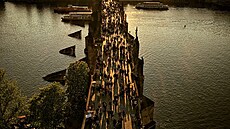
Když jsem, tehdy ještě v minulém století, Prahu navštívil poprvé, byla z toho láska na první pohled.
Migrace v souvislostech
Hassan Ali Djan: Příběh dítěte, které vyrostlo příliš brzy
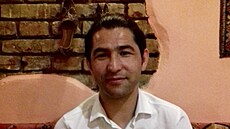
Hassan Ali Djan pochází z Afghánistánu. Je autorem autobiografické knihy Afghánistán. Mnichov. Já. Ve své knize popisuje svůj odchod z Afghánistánu, tíživou cestu do Evropy a začátky v nové zemi, kterou časem přijal za svůj domov.
Migrace v souvislostech
Mikuláš do každé vietnamské večerky
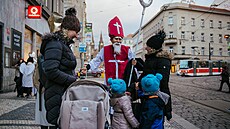
„A teď budou Češi říkat, že už jim bereme i jejich svátky a zvyky,” pronesl v položertu mladý vietnamský dobrovolník, který 5. prosince 2017 stál na rušné pražské ulici převlečený za čerta.
Migrace v souvislostech
Mezi Pegidou a kurzem němčiny: jak funguje integrace uprchlíků v Drážďanech?
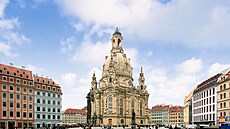
Nejpozději od památného výroku kancléřky Merkelové „Wir schaffen das!“ (Zvládneme to!) se pohledy odpůrců migrace, ale také aktérů a organizací zabývajících se integrací v různých zemích Evropy upírají do Německa.
Migrace v souvislostech
Svátek práce: jak čeští imigranti v USA psali dějiny
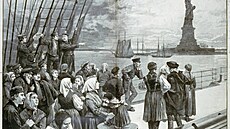
První květen je každoročně dnem, kdy si připomínáme boj dělníků za důstojné pracovní podmínky, jehož výsledkem bylo ustavení osmihodinového pracovního dne. K jeho hlavním aktérům patřili i imigranti z Česka.
Migrace v souvislostech
Před čím prchají Eritrejci?
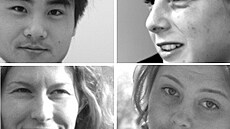
Eritrea je hned po Sýrii zemí s největším zájmem o migraci do zemí Evropy. Důvodem není válka, přestože určité napětí z války s Etiopií v letech 1998-2000 přetrvává dodnes.
Migrace v souvislostech
Vánoční povídka o odchodu všech cizinců
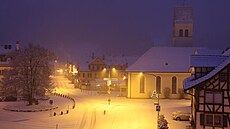
Bylo nebylo.... asi tři dny před Vánoci, pozdě večer. Po náměstí v jednom malém německém městečku přešla skupinka mužů.
Migrace v souvislostech
Vánoce na Blízkém Východě

Blízký východ je kolébkou křesťanství, které se odtud postupně rozšířilo do celého světa, v současné době však křesťané v tomto regionu tvoří pouze malou menšinu rozdělenou do různých vyznání.
Migrace v souvislostech
Přijde mi nefér, že nemůžu mít dvojí občanství, říká studentka vysoké školy
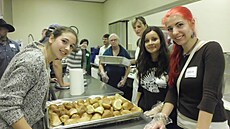
Narodila se na Slovensku, ale už osmnáct let žije v České republice. Má slovenské občanství, ale občanku ne. A to ani českou. Michaela Hollá toho ve svém volném čase zvládá opravdu hodně.
Migrace v souvislostech
Ztraceno „v přenosu“. Ve Varnsdorfu proběhl workshop mediální výchovy.
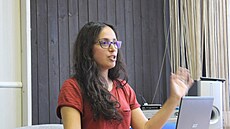
„A setkala jste se někdy třeba s rasismem?“ přiletí na novinářku Fatimu Rahimi další otázka z lavic, kde sedí přes dvacet středoškoláků.
Migrace v souvislostech
Nejistá práce přes agentury brzdí zapojení do společnosti
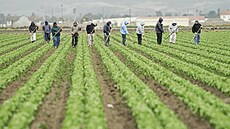
Kdo hledá v Česku práci? V posledních letech se to mění a mezi cizinci, kteří u nás chtějí pracovat, přibývá lidí ze zemí na východě a jihovýchodě Evropské unie.
Migrace v souvislostech
Jak se dětem imigrantů daří ve škole?

Na děti migrantů a uprchlíků čekají ve školách různé překážky, kterým jejich vrstevníci z hostitelské země čelit nemusí.
Migrace v souvislostech
Kdo je terčem nenávistných projevů na českém internetu?

Od začátku roku 2015 zaznamenal český internet nárůst negativních a nenávistných projevů na sociálních sítích a dalších komunikačních platformách, jako jsou například diskuze na zpravodajských serverech.
Migrace v souvislostech
Jsou migranti přínosem?

Migranti jsou často obviňováni, že jsou těmi, kteří zabírají práci místnímu obyvatelstvu, nebo že jsou těmi, na které se utrácí příliš velká část státního rozpočtu ve formě sociálních dávek a nouzových příspěvků.
Migrace v souvislostech
Radikalismus v jakékoliv podobě je velmi nebezpečný, napsala studentka gymnázia.

"Ubytovat uprchlickou rodinu? Za mě ano." Přečtěte si další z textů, které napsali na podzim 2015 studenti středních škol zapojení do projektu Média a migrace na středních školách.
Migrace v souvislostech
Co obnáší být cizinkou v ČR. I o tom se vedla debata se studenty v Mostě.

Jak těžké je získat studijní vízum a co všechno to obnáší, být cizinkou v naší zemi. I to se mohli dozvědět student Střední školy diplomacie a veřejné správy v Mostě.
Migrace v souvislostech
Jeden křičel přes druhého. Workshop o migraci vzbudil mezi studenty vášně.

Jak se studentům ze Střední odborné školy Český Brod – Liblice líbil workshop a následná návštěva Českého rozhlasu, které pro ně uspořádal v průběhu podzimu 2015 Program migrace organizace Člověk v tísni?
Migrace v souvislostech
Syrští uprchlíci potřebují větší pomoc

Politická situace na okrajích Evropy se v posledních letech zhoršuje a spolu s ní se zhoršují i podmínky k žití v zemích přímo sousedících s Evropskou unií i těch, které sice nesousedí, ale přesto ještě nejsou příliš daleko. Válka na Ukrajině vyhnala z domovů desetitisíce obyvatel. Pokračující, a do Iráku se rozpínající válka v Sýrii už miliony. Zatímco média i politici se v poslední době aktivně věnují více Ukrajině a jednáním s Ruskem, z hlediska migrace je syrská občanská válka stále palčivějším problémem.
Migrace v souvislostech
Jak najít v Praze Mexičany...

Najít v centru Prahy mexické jídlo je jednoduché. Každá letní zahrádka nabízí ve svém menu margaritu. Najít lidi pocházející z Mexika už tak jednoduchý úkol není.
| předchozí | 1 2 3 4 | další |

